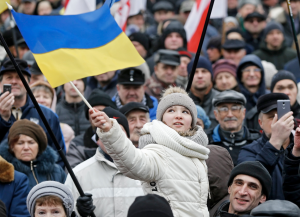Time for Ukraine’s post-revolution liberals to step up
Source: New Europe / www.neweurope.eu / By Sasha Borovik /
Former First Deputy Minister of Economy of Ukraine responsible for the international donor coordination, and Former Acting Deputy Governor at Odessa Regional State Administration.

In times of crisis, like in today’s Ukraine, events unfold based largely on ideas that are floating in the political air and take root in the fertile minds of creative individuals who can give them birth, articulate them with power, and forge them into effective tools for historic change. This task sometimes falls on the broad shoulders of those few individuals ready to accept the risks and responsibility offered by such historic moments.
In this regard, no one captured the moral high ground of his historical moment better than Vaclav Havel. “The salvation of this human world” – he said – “lies nowhere else than in the human heart, in the human power to reflect, in human meekness and human responsibility.”
Because of his sense of responsibility to his beloved country Havel, a poet, long opposed the Communist regime in his homeland, Czechoslovakia. In 1976, the arrest of members of a Czech rock group called The Plastic People of the Universe gave birth to the Czechoslovak dissident movement known as Charter 77.
Havel was one of its founders and for that, he was imprisoned.
I had the good fortune to meet him in the early 1990s when I moved to Prague. I encountered a small man, wearing a rumpled sweater and jeans: a playwright, not a politician. He was shy, yet resilient, overly polite, yet deceptively decisive; and a true nonconformist.
Some of his views later became controversial domestically – he reluctantly criticised the consumerism of voters and the greed of corporations. He was determined to project moral authority and was not afraid of taking political risks for important principles.
Times of crisis can be liberating. They allow you to break free of long-held, but outdated, beliefs. On the other hand, crises can also cause you to retreat deeper into your failed, but familiar, world. Taking a step into the unknown, or giving voice to a new idea, can often be what people fear most. Something of this can be seen in post-revolution Ukraine and other countries of the former Soviet-led Eastern Bloc. Activists who fearlessly protested and opposed repressive and corrupt regimes now find they are not yet ready to step up and take full responsibility for their country’s future.
Consider the example of Svyatoslav Vakarchuk, the lead vocalist of Okean Elzy, the most successful post-Soviet rock band in Ukraine. His moral authority and moving use of music and the Ukrainian language cast him as the dominant figure during street demonstrations in 2014 and afterwards.
With a degree in theoretical physics, Vakarchuk repeated many times that he had no political ambitions. Yet, it looked briefly as if he might have a change of heart in 2018 when he joined Stanford as a visiting scholar and spoke often on Ukrainian political issues. This led liberal Ukrainians to view him as their potential candidate for the 2019 presidential election.
But while liberal groups in Ukraine waited for Vakarchuk to unite them, he refused to run. “Who can change the political culture is more important than who becomes the president”, Vakarchuk said. The new liberal class of Ukrainians was left with no one among the front-runners with whom they could identify or who could unite them.
In 1988, one month before the Velvet Revolution in Czechoslovakia, Havel also was justifiably wary of becoming a politician. “What we need are real political figures with charisma and a programme. I will be engaged as an amateur, not as a professional. I’m a writer, not a politician. I would like to be a kingmaker, but not a king.”
Still, when it mattered most, Havel stepped up. First, he united the diverse opposition groups into the Civic Forum party, which played a major role in the revolution that toppled communism in Czechoslovakia in 1989. Then, he assumed responsibility for leading the nation as its president and was later reelected in a landslide. He also was instrumental in dismantling the Warsaw Pact and expanding NATO membership eastward.
The parallels between Havel and Vakarchuk go beyond their natural speaking styles. Like Havel, Vakarchuk is an intellectual who loves his country. He also possesses a wry humour and is quick to see life as it is. He also seems genuinely committed to shaping his country into a model of 21st century economic and political renewal.
I last saw Havel one summer day at a Paul Simon concert in Prague. It was a noisy, crowded gathering full of youngsters. He pulled off his sweater and waved it over his head to the rhythm of “Bridge Over Troubled Waters”. He was the happiest and most natural politician I have ever seen. He entered politics, achieved great things when great things were badly needed, and walked away admired, respected, and uncorrupted.
Vakarchuk, or for that matter any other Ukrainian liberal, should not be afraid to enter politics or to take responsibility. They need to step up. They should unite, select a leader or leaders – possibly even strangers to politics, as long as those leaders are honest, principled, and courageous. Together they should run for office, win important posts, combat the corruption that cripples Ukraine, appoint new judges, and do things that demonstrate that this new liberal class is ready to take full responsibility for the future of their country.
This also requires some introspection on the part of Western leaders. While there is an obvious need for liberal Ukrainian groups to deliver a strong message of unity and political responsibility, NGOs active in Ukraine also must continue to develop a pipeline of young leaders with the critical political skills required to help this new generation of leader-in-waiting finally come of age.

